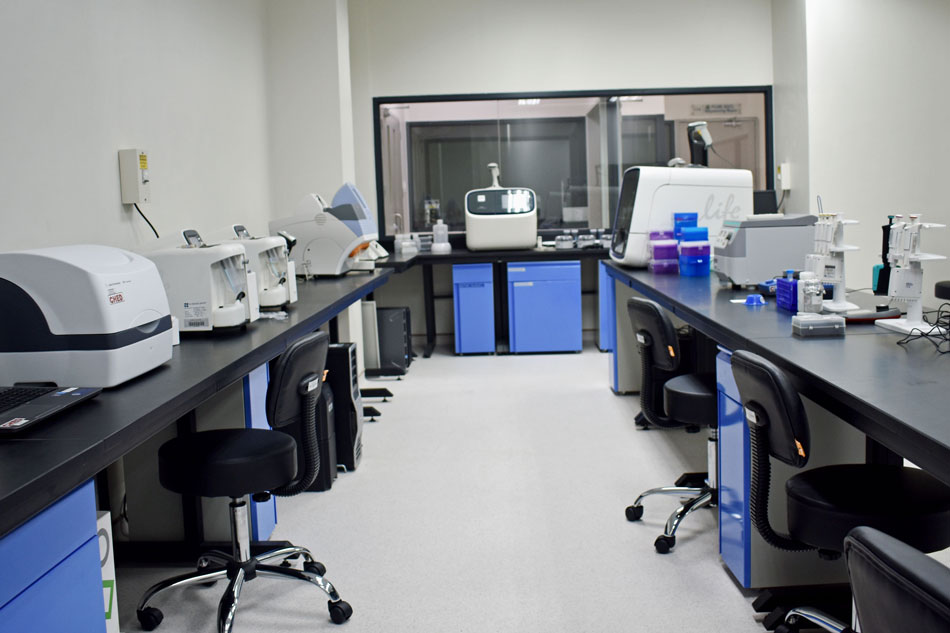Filipino scientists offer help in detecting 2019-nCoV in PH | ABS-CBN
ADVERTISEMENT

Welcome, Kapamilya! We use cookies to improve your browsing experience. Continuing to use this site means you agree to our use of cookies. Tell me more!
Filipino scientists offer help in detecting 2019-nCoV in PH
Filipino scientists offer help in detecting 2019-nCoV in PH
Davinci Maru,
ABS-CBN News
Published Jan 30, 2020 08:19 PM PHT
MANILA - A research facility in the University of the Philippines (UP) said Thursday it would help health authorities confirm cases of the 2019 novel coronavirus (2019-nCoV) in the country.
MANILA - A research facility in the University of the Philippines (UP) said Thursday it would help health authorities confirm cases of the 2019 novel coronavirus (2019-nCoV) in the country.
"The Philippines has the tools and cutting-edge equipment, trained DNA sequencing staff, and scientists to help validate the presence of 2019-nCoV in the country by sequencing the whole viral genome from samples collected from patients," Dr. Cynthia Saloma, executive director of the Philippine Genome Center (PGC), said in a statement.
"The Philippines has the tools and cutting-edge equipment, trained DNA sequencing staff, and scientists to help validate the presence of 2019-nCoV in the country by sequencing the whole viral genome from samples collected from patients," Dr. Cynthia Saloma, executive director of the Philippine Genome Center (PGC), said in a statement.
The facility will assist the Department of Health (DOH) and Research Institute for Tropical Medicine (RITM) on diagnosing possible cases of the illness, which has killed at least 170 in China as of Thursday. Some 81,000 others globally are under observation for possible infection.
The facility will assist the Department of Health (DOH) and Research Institute for Tropical Medicine (RITM) on diagnosing possible cases of the illness, which has killed at least 170 in China as of Thursday. Some 81,000 others globally are under observation for possible infection.
Using a Next Generation DNA/RNA Sequencing (NGS) equipment, the Philippines will no longer have to send samples of suspected 2019-nCoV cases abroad, said Dr. Jan Michael Yap, head of PGC's core facility for bioinformatics.
Using a Next Generation DNA/RNA Sequencing (NGS) equipment, the Philippines will no longer have to send samples of suspected 2019-nCoV cases abroad, said Dr. Jan Michael Yap, head of PGC's core facility for bioinformatics.
ADVERTISEMENT
"We can do it here," he told ABS-CBN News in a phone interview, adding the results could be released after 3 days.
"We can do it here," he told ABS-CBN News in a phone interview, adding the results could be released after 3 days.
The equipment, Yap said, is a fast, accurate way of identifying the genetic information of viruses.
The equipment, Yap said, is a fast, accurate way of identifying the genetic information of viruses.
The Philippine government already confirmed the country's first case, a 38-year-old woman from Wuhan, China who arrived in Manila on January 21.
The Philippine government already confirmed the country's first case, a 38-year-old woman from Wuhan, China who arrived in Manila on January 21.
The woman arrived in Manila via Hong Kong on Jan. 21. She is now in an undisclosed government hospital.
The woman arrived in Manila via Hong Kong on Jan. 21. She is now in an undisclosed government hospital.
The Philippines had been sending specimen samples to the Victorian Infectious Disease Reference in Australia to confirm if the patient is infected with the new coronavirus.
The Philippines had been sending specimen samples to the Victorian Infectious Disease Reference in Australia to confirm if the patient is infected with the new coronavirus.
"Before wala pa kasing existing data on what the 2019-nCov looks like," Yap said.
"Before wala pa kasing existing data on what the 2019-nCov looks like," Yap said.
The facility is also in talks with the DOH of creating confirmatory test kits to swiftly identify patients carrying the strain, he added.
The facility is also in talks with the DOH of creating confirmatory test kits to swiftly identify patients carrying the strain, he added.
"We are now preparing our materials, tools and equipment. We are ready to assist at any moment," Yap said.
"We are now preparing our materials, tools and equipment. We are ready to assist at any moment," Yap said.
The World Health Organization (WHO) had said coronaviruses were a large family of viruses ranging from the common cold to more severe diseases such as the Middle East Respiratory Syndrome (MERS-CoV) and Severe Acute Respiratory Syndrome (SARS).
The World Health Organization (WHO) had said coronaviruses were a large family of viruses ranging from the common cold to more severe diseases such as the Middle East Respiratory Syndrome (MERS-CoV) and Severe Acute Respiratory Syndrome (SARS).
Fever, cough and breathing difficulties are among its symptoms, the UN health agency added.
Fever, cough and breathing difficulties are among its symptoms, the UN health agency added.
Read More:
Philippine Genome Center
PGC
University of the Philippines
UP
health
virus
coronavirus
2019 novel coronavirus
2019-nCoV
disease
ADVERTISEMENT
ADVERTISEMENT



